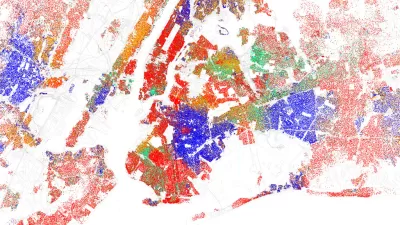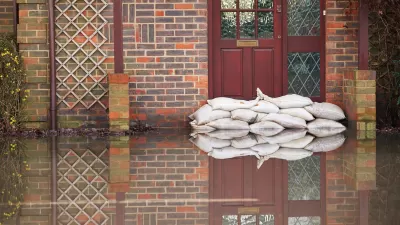Commentators relentlessly debate whether Donald Trump's support hinges on economics or race. Alexis C. Madrigal discusses how the two are joined at the hip, especially in real estate.

Making no attempt to hide his dislike for the candidate, Alexis C. Madrigal points out the folly of separating race and economics as factors in Donald Trump's rise. Looking at the history of segregated American real estate, Madrigal asserts that "for white people in America, 'economic anxiety' has always had a racial component.
"As early 20th century American real estate appraisers 'professionalized' their methods, they built a discriminatory system that literally ranked homes in white northern European neighborhoods as more valuable than homes in neighborhoods where black people (or Mexicans) lived." This provided the germ for "white flight" and troubled "inner cities" in the late 20th century.
Frederick Babcock's 1932 book The Valuation of Real Estate makes a prescient and racist case. As cities develop, "the central districts of a city were built first and were highly valuable, but then prices would fall as the upper classes moved to new housing further and further from the downtown core. At the same time, the closer-in neighborhoods would be successively 'infiltrated' by lower and lower classes."
The way to deal with this, Babcock argued, was to accept it and segregate the classes, by which he also meant races. This theoretical framework informed business and policy choices of later decades, essentially writing itself onto America's urban fabric.
Madrigal denounces how easy it is for otherwise "kindly" white people to accept a system that assigns lower value to non-white households. "So if a black family bought a house on a white family's block, they were effectively costing the white family money."
FULL STORY: Donald Trump and the truth about race and real estate in America

Planetizen Federal Action Tracker
A weekly monitor of how Trump’s orders and actions are impacting planners and planning in America.

Maui's Vacation Rental Debate Turns Ugly
Verbal attacks, misinformation campaigns and fistfights plague a high-stakes debate to convert thousands of vacation rentals into long-term housing.

Restaurant Patios Were a Pandemic Win — Why Were They so Hard to Keep?
Social distancing requirements and changes in travel patterns prompted cities to pilot new uses for street and sidewalk space. Then it got complicated.

In California Battle of Housing vs. Environment, Housing Just Won
A new state law significantly limits the power of CEQA, an environmental review law that served as a powerful tool for blocking new development.

Boulder Eliminates Parking Minimums Citywide
Officials estimate the cost of building a single underground parking space at up to $100,000.

Orange County, Florida Adopts Largest US “Sprawl Repair” Code
The ‘Orange Code’ seeks to rectify decades of sprawl-inducing, car-oriented development.
Urban Design for Planners 1: Software Tools
This six-course series explores essential urban design concepts using open source software and equips planners with the tools they need to participate fully in the urban design process.
Planning for Universal Design
Learn the tools for implementing Universal Design in planning regulations.
Heyer Gruel & Associates PA
JM Goldson LLC
Custer County Colorado
City of Camden Redevelopment Agency
City of Astoria
Transportation Research & Education Center (TREC) at Portland State University
Jefferson Parish Government
Camden Redevelopment Agency
City of Claremont





























